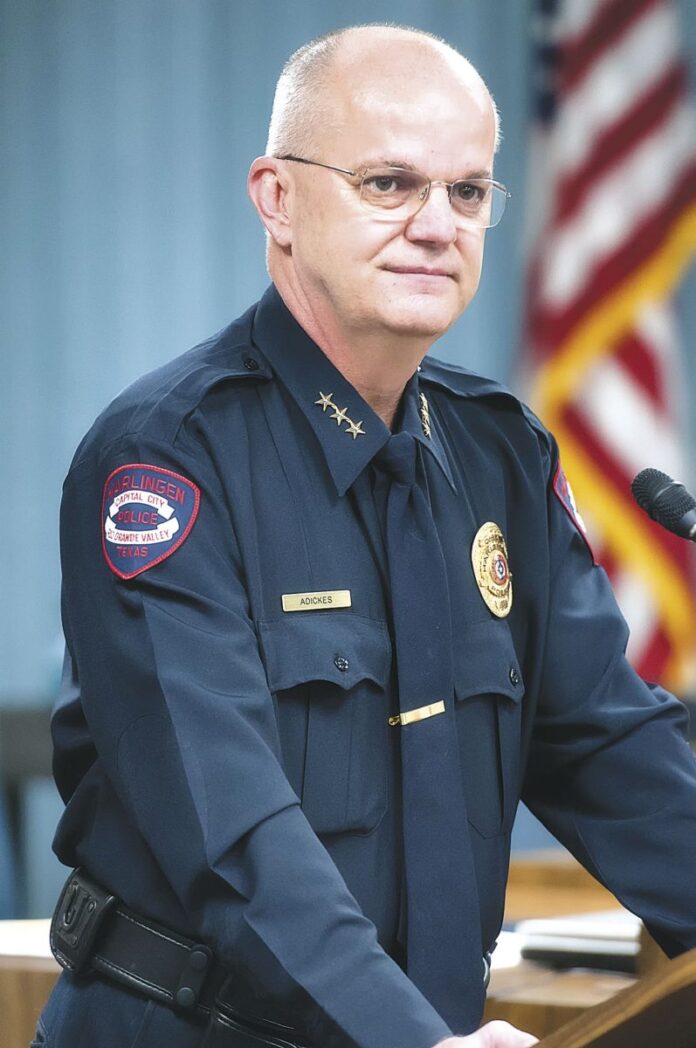HARLINGEN — New police officers and cadets are reaching out to diverse groups to better serve the community.
Police Chief Jeffry Adickes launched the Community Immersion Project, assigning new officers to better understand the homeless, the mentally ill and the LGBTQ community.
“Those groups sometimes feel disenfranchised if we don’t serve them well,” Adickes said. “It’s about being thoughtful in enforcement.”
Adickes developed the program, which earned a certificate of recognition from the International Association of Chiefs of Police Civil Rights Committee, while working with the Austin Police Department in 2003.
“It’s kind of cutting-edge,” Adickes said. “I’m really proud of it.”
Adickes launched the project with a training session aimed at helping new officers better understand the importance of reaching out to the three groups as well as other “cultures” within the Harlingen community.
“This program pushes new HPD servant leaders out in the community to learn about cultures that sometimes feel disenfranchised when dealing with police officers on the street and our civilian dispatchers or jailers so they can better understand them and ultimately better serve them,” according to a press release announcing the program.
“The program is built on bridging mutual respect, mutual trust and understanding.”
It’s all part of “community policing,” Adickes told a class of new officers and cadets.
“When we talk about community policing, we’re investing in the community,” Adickes told the class Thursday. “It’s not just a philosophy, it’s the way we do business at the Harlingen Police Department.”
Adickes stressed the importance of understanding that public perceptions about police are based on experiences.
“Excessive force, dishonesty and poor service” can shatter the public’s trust in police, he said.
He said an officer’s “poor experience” reflects on the police department.
“You never get a second chance to make a first impression,” Adickes said. “When you go out you’re building a reputation. When they see a Harlingen police car, it’s important they trust us.”
Officer Jacob Perez, who was hired in January, said he wants to help build “community trust.”
“Many times the community reaches out to police for help,” Perez said in an interview. “We’re reaching out to the community to see what we can do to help.”
Officer Yesenia Vega, who took the job last year, said she wants the community to better understand her work as a police officer.
“Community policing is about us getting involved with the community, empathizing with all members of the community no matter what race, gender, ethnicity or culture,” Vega said.
“We want people to be less aggressive with police. We want them to understand we’re human, just like them. You have people highly intoxicated, mentally unstable. We want them to understand we’re here for them. We’re here to help.”
Officer Isaac Silva, who’s worked with the department for about a year, said the community can help officers do their jobs.
“It’s good to build a rapport, even with the people we arrest,” Silva said. “They may know information we don’t. They’re real helpful. ‘Be cool with us, we’ll be cool with you.’”
As part of the project, new officers will spend 40 to 50 hours reaching out to the homeless, the mentally ill and the LGBTQ community, Adickes said.
Officers will interview group members to learn “what these cultures expect,” documenting their research.
Then in about two months, the police department will hold a public forum in which the groups will teach a class on their cultures.
“The most important thing is that we are building Harlingen police officers and they are building relationships and learning about the cultures as they are in Harlingen and the Rio Grande Valley,” the press release said.




